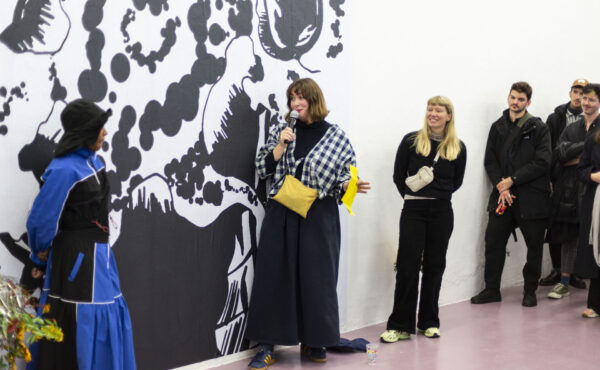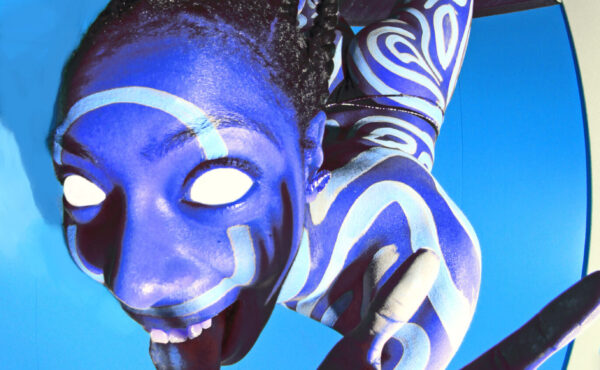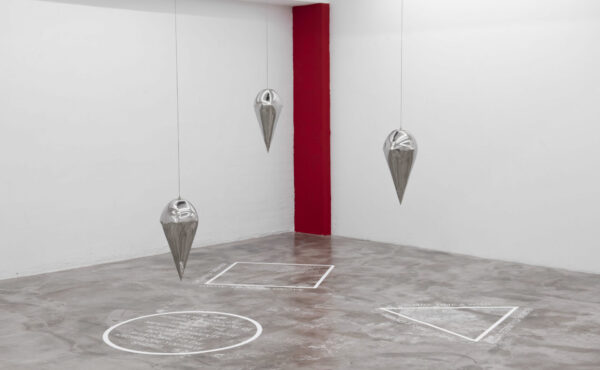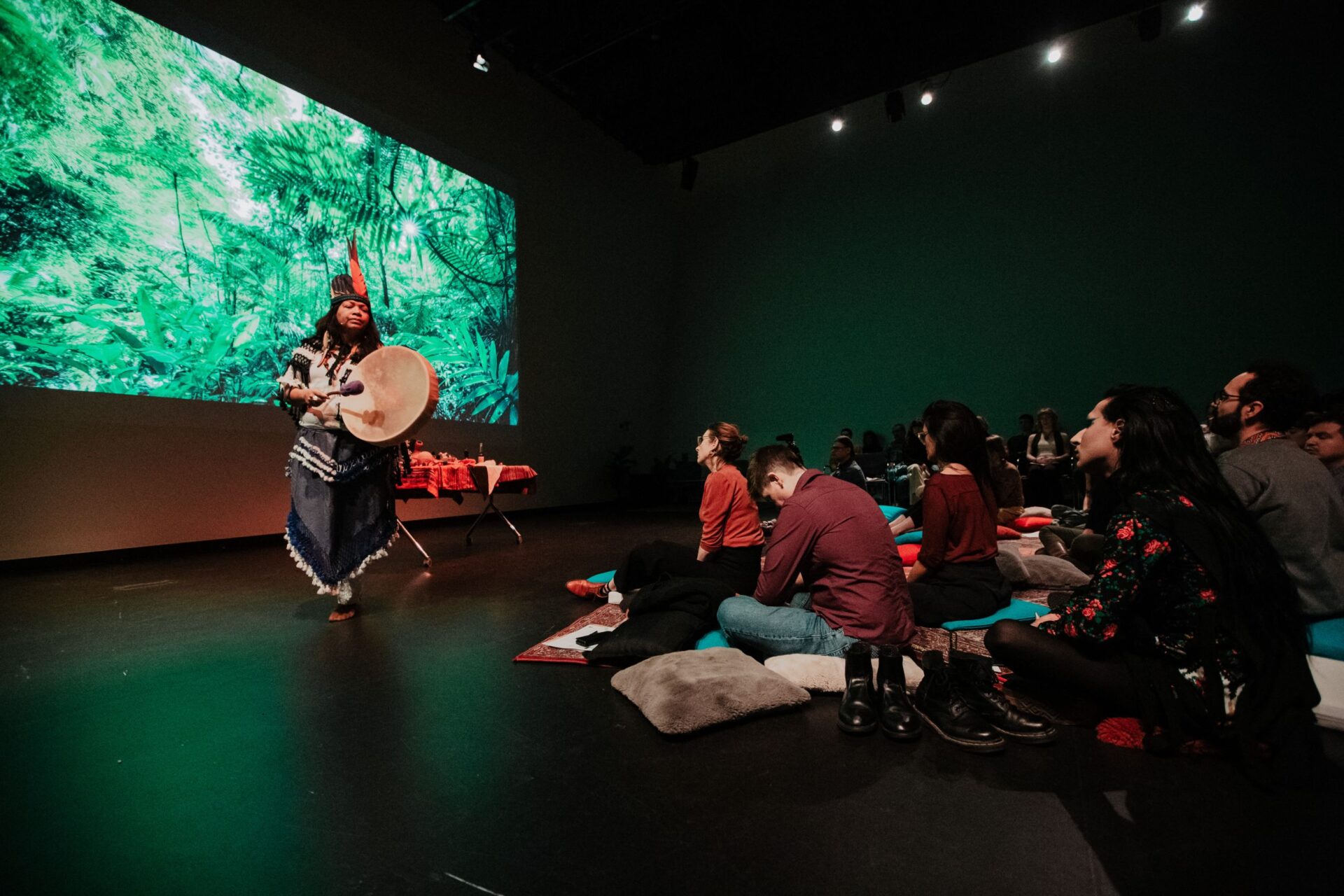
First day of ‘Towards a Post-Extractive Culture: A gathering of souls dreaming and building a world of many worlds’ at Stedelijk Museum Amsterdam (third day was hosted by OT301) Photo: Laura Ponchel
A ‘post-conference’ on post-extractive culture: three days of dreaming worlds
The collaborative symposium ‘Towards a Post-Extractive Culture: A gathering of souls dreaming and building a world of many worlds’ at Stedelijk Museum Amsterdam and OT301 invites its audience ‘to learn and unlearn by disobedient futures’. Ilaria Obata reports on three days of ‘deep listening’, intergenerational storytelling and knowledge sharing.
Ambitious, dense, provocative and experimental in its premise, Towards a Post-Extractive Culture, co-organized and co-created by Disobedient Futures (formerly known as Fossil Free Culture NL), the Post-Extractive Futures collective, Global Tapestry of Alternatives, Weaving Realities, Gira Zapatista Holanda and entre-ríos, was structured in a way that challenged the conventional ‘conference’ model. Clear in the intent to shift from formal panel discussions towards collective assemblies, the symposium consisted of three full days of collective gathering; intimate workshops, thinking-feeling storms, assemblies, and ritual performances. This assemblage of different forms and ways of being, speaking, thinking and making together created the basis from which to question and critique existing colonial and capitalist infrastructures that continue to define our present context, and which are deeply embedded within our quotidian lives.
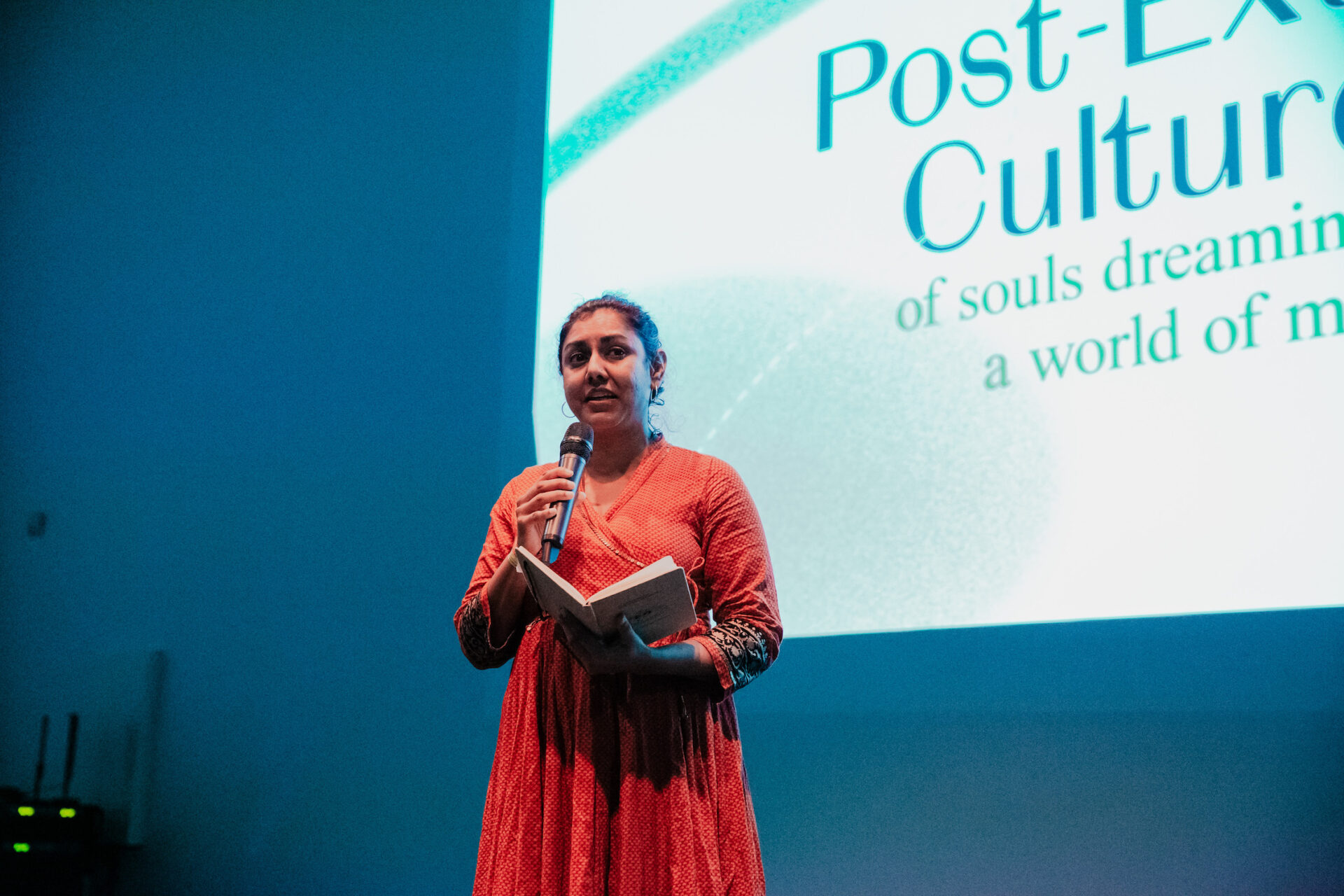
First day of ‘Towards a Post-Extractive Culture: A gathering of souls dreaming and building a world of many worlds’ at Stedelijk Museum Amsterdam (third day was hosted by OT301) Photo: Laura Ponchel
Day 1
Eager to visualise this conceptual creation of a ‘post-conference’ model, I entered the Stedelijk for the first day of activities with high hopes. We were given a booklet with community guidelines on arrival, intended to ‘create a safer space for us to meet each other with generosity, vulnerability, curiosity and compassion as we learn and explore together what a post-extractive culture could look like’. Similar guidelines or ‘house rules’ are often found in clubs, festivals, music and arts events. Yet, they are rarely ever seen in museum spaces. I was especially interested to witness whether the setting of the Stedelijk Museum would offer a contradictory space for the gatherings, but understood that the space was also used to challenge the very structures it continues to uphold. Even though the actual symposium took place in an auditorium of the museum, it was a way for the museum to continue questioning and rethinking contemporary societal questions around issues of heritage, cultural identity and belonging.
Clear in the intent to shift from formal panel discussions towards collective assemblies, the symposium consisted of three full days of collective gathering; intimate workshops, thinking-feeling storms, assemblies, and ritual performances
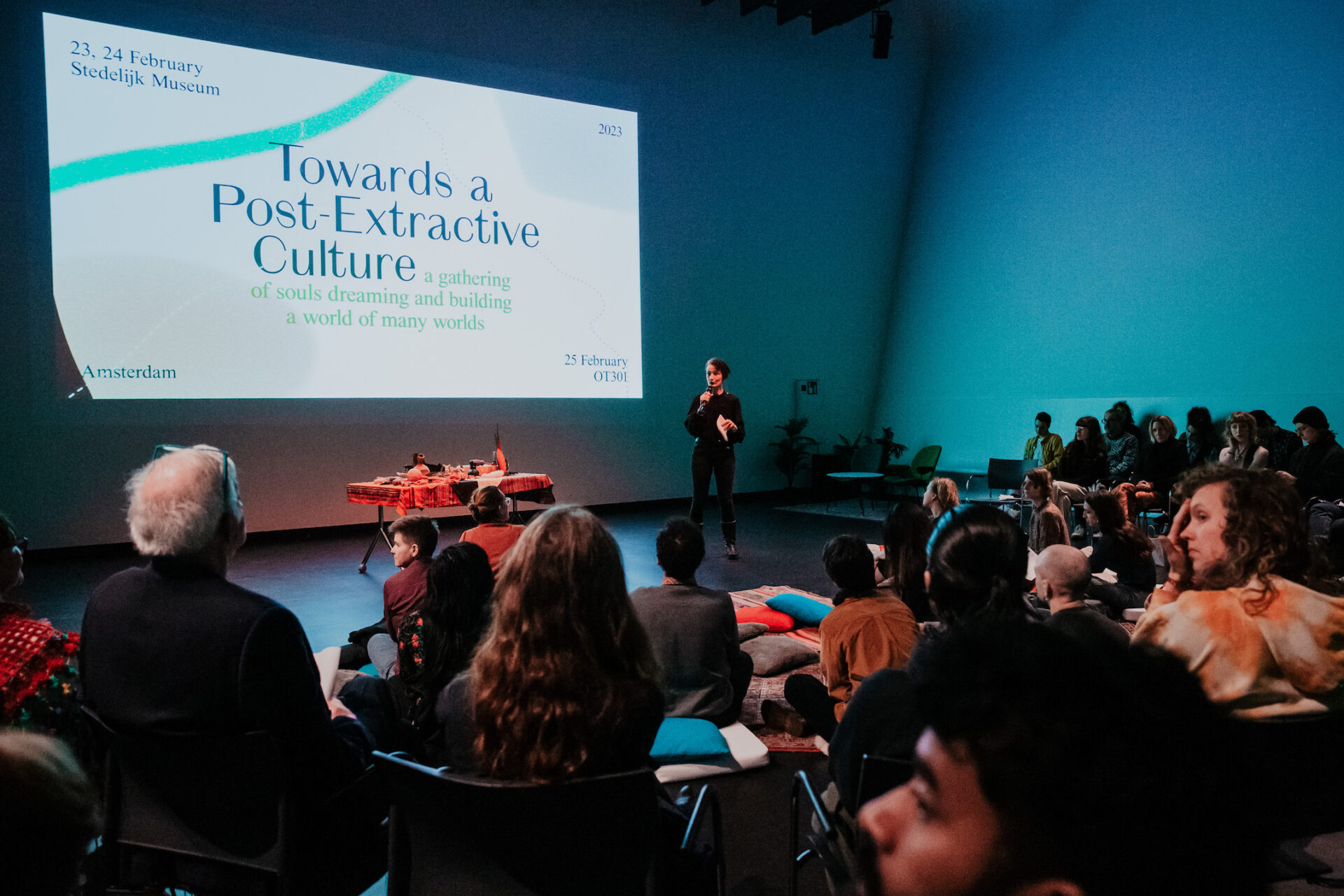
First day of ‘Towards a Post-Extractive Culture: A gathering of souls dreaming and building a world of many worlds’ at Stedelijk Museum Amsterdam (third day was hosted by OT301) Photo: Laura Ponchel
Frida Daniela Paes Leão (co-organizer of the Disobedient Futures collective and moderator for the day) encouraged participants to sit comfortably on the floor in a cocoon-type nest of pillows and blankets, and to enter a process of ‘deep listening’. This format, far from a typical ‘conference’ format, lessened the distance between the speaker and the listener. The small space between the participants and the speakers set the tone for the rest of the day, as the aim was to ‘share generously’ through practices of storytelling.
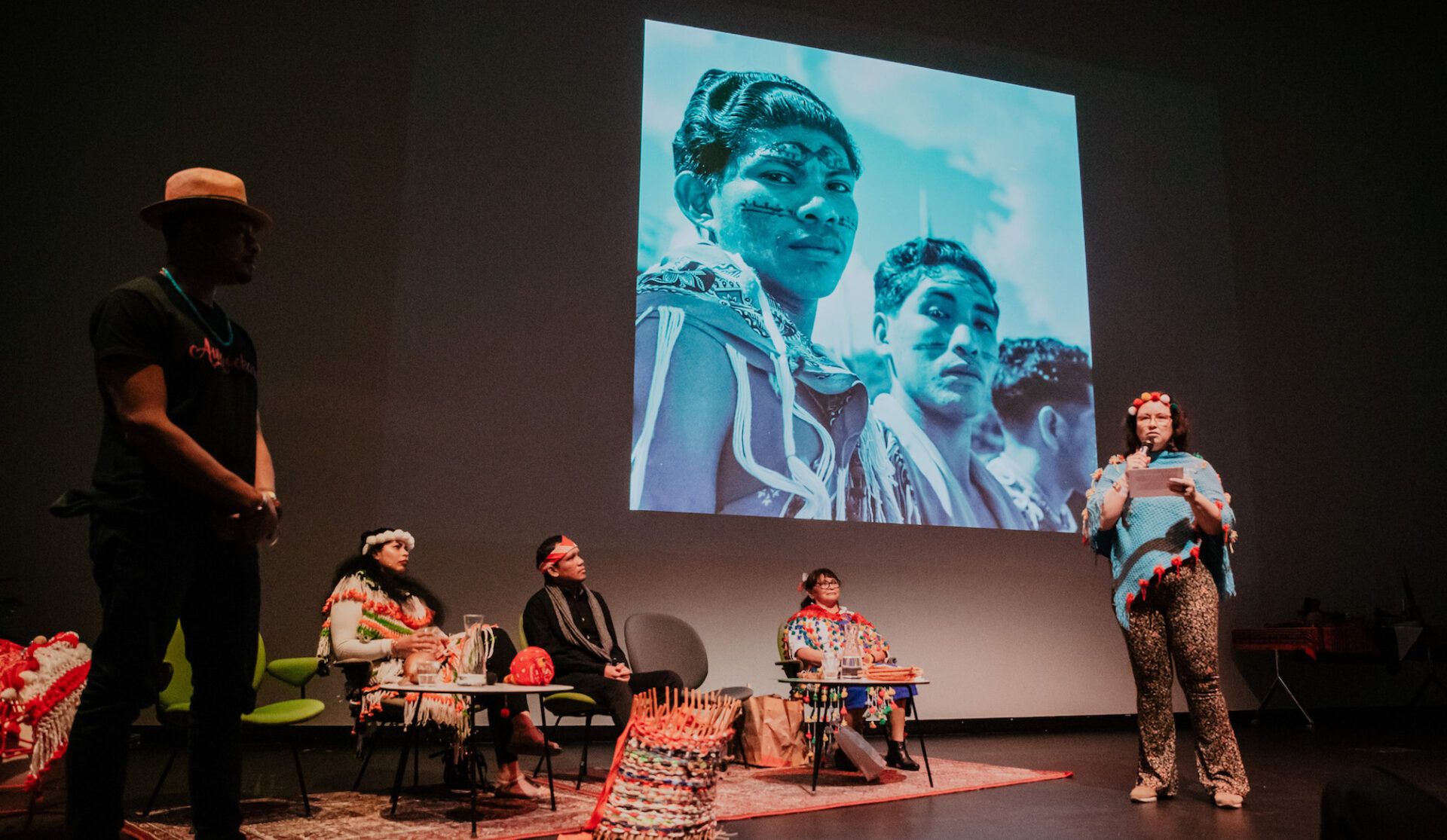
First day of ‘Towards a Post-Extractive Culture: A gathering of souls dreaming and building a world of many worlds’ at Stedelijk Museum Amsterdam (third day was hosted by OT301) Photo: Laura Ponchel
The organisers explained that the aim of the day was to ‘build new structures of knowledge around cosmologies drawn from indigenous ancestral practices and relationships with the territory’. This was situated with a ceremony led by Olivia Biswane, where we were asked to bring ourselves out of our contextual setting and into a natural environment. Sounds of the forest lulled us along with the beat of a drum that created a soundscape for the listener to delineate feelings of kinship – with oneself, with one another and with nature. Biswane asked participants ‘to be in charge of your own authentic cosmic being’, and ‘the most authentic version of ourselves’.
Sounds of the forest lulled us along with the beat of a drum that created a soundscape for the listener to delineate feelings of kinship – with oneself, with one another and with nature
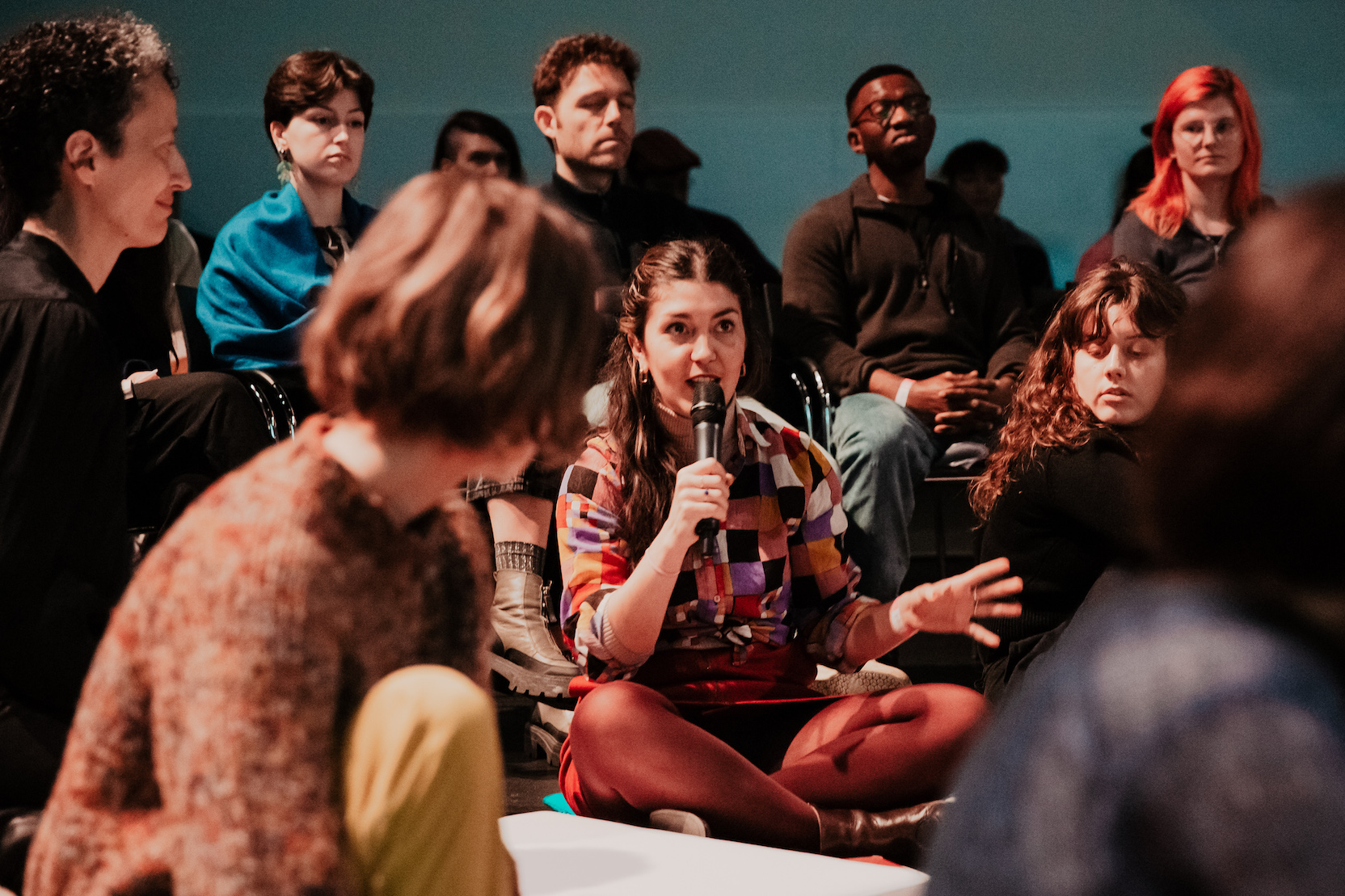
First day of ‘Towards a Post-Extractive Culture: A gathering of souls dreaming and building a world of many worlds’ at Stedelijk Museum Amsterdam (third day was hosted by OT301) Photo: Laura Ponchel
With the intention set, we moved onto the first discussion the: Indigenous Knowledge Center with Martha Sabajo, Leander Vermaning, Simyuru Tjaaroeme, Aweroekana Cultura and Wasjikwa Foundation. Sabajo and Vermaning shared their stories of familial ties and personal connections to their people, the Lokono community in Suriname, and the indigenous knowledge and heritage they continue to protect and make visible from Suriname to the Netherlands – from natural surroundings to buildings and cityscapes. Vermaning emphasised the importance of intergenerational storytelling in keeping alive the knowledge of one’s ancestors and the material and immaterial heritage that one brings with them – as a way of holding onto a sense of belonging to an original home after migratory and diasporic movement.
Stedelijk Design Curator, Amanda Pinatih, then introduced the current Stedelijk exhibition When Things are Beings. This direct jump from (personal) intergenerational storytelling towards a more institutional voice, reminded me once again how much the setting of the symposium, within a museum space, continued to influence the structure of this day. Pinatih shifted our focus from the discussion on indigenous knowledge sharing towards the question of gatekeeping knowledge, in order to protect a knowledge that can be used, appropriated and undermined by a dominant Western hegemonic discourse within museums.
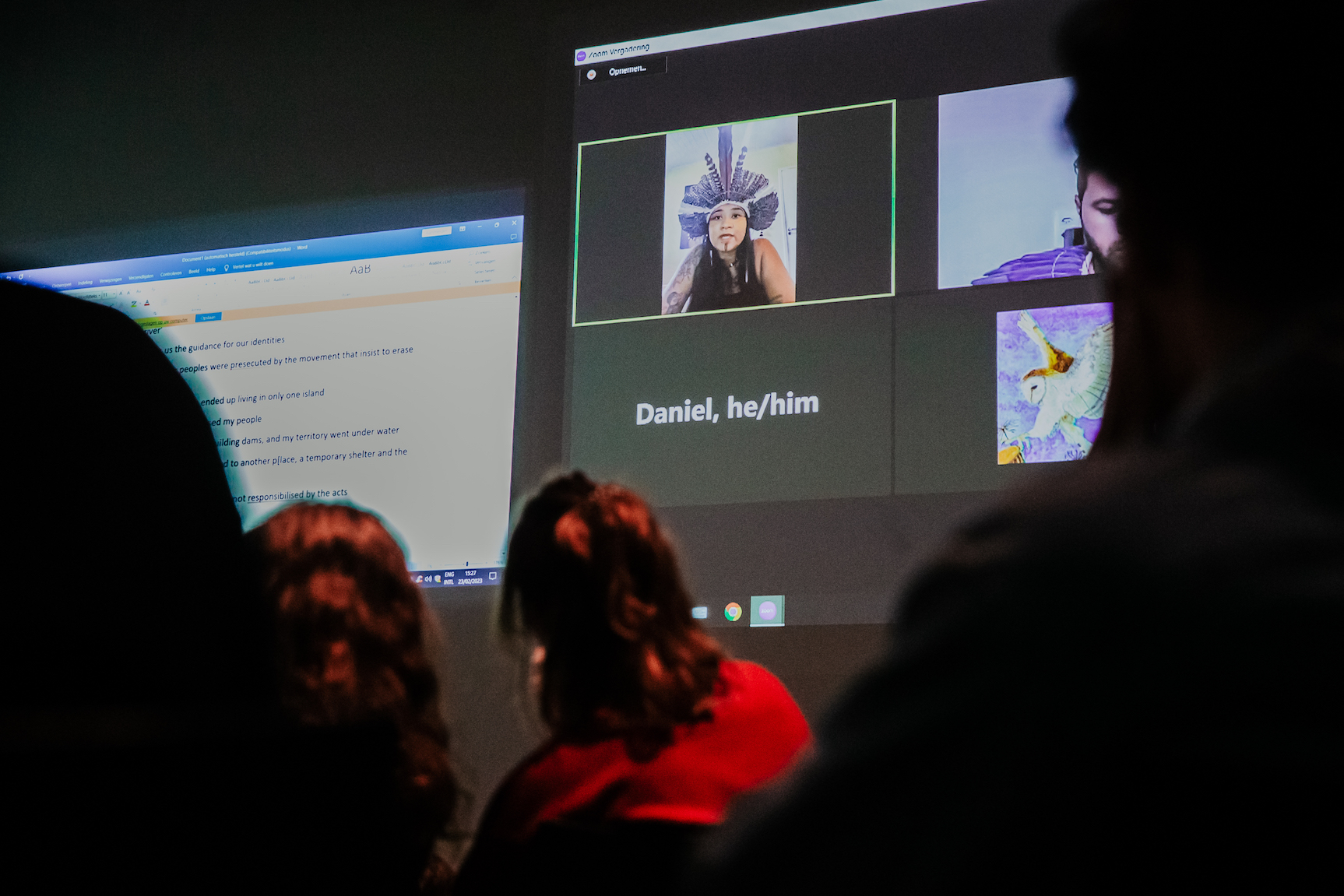
First day of ‘Towards a Post-Extractive Culture: A gathering of souls dreaming and building a world of many worlds’ at Stedelijk Museum Amsterdam (third day was hosted by OT301) Photo: Laura Ponchel
The exhibition speaks directly of the life that objects hold in terms of ancestral knowledge. Pinatih spoke of ‘Guna Guna’, a ‘silent force, not in the physical sense, but a magical force and power that travelled here from Indonesia to the Netherlands and was used to harm the colonisers, becoming a taboo’. Guna guna was used through rituals, spells and the use of certain objects, to make someone sick, to bewitch and to control them. This force can be seen to offer critical conditions of thinking, and as a tool to protect one’s own personal heritage. This term offered quite a beautiful juxtaposition to the symposium as a whole, seeing as the dualities of keeping and taking, and of sharing and hiding, became so evident throughout these discussions, as each speaker conveyed an urgency for a dynamic relationality through kinship and care; between material and immaterial heritage, between knowledge that is to be shared, and that which remains within us.
The second part of the symposium day consisted of a hybrid zoom session, wherein the audience was introduced to the artistic collective situated in the northeast of Brazil: Um Outro Céu
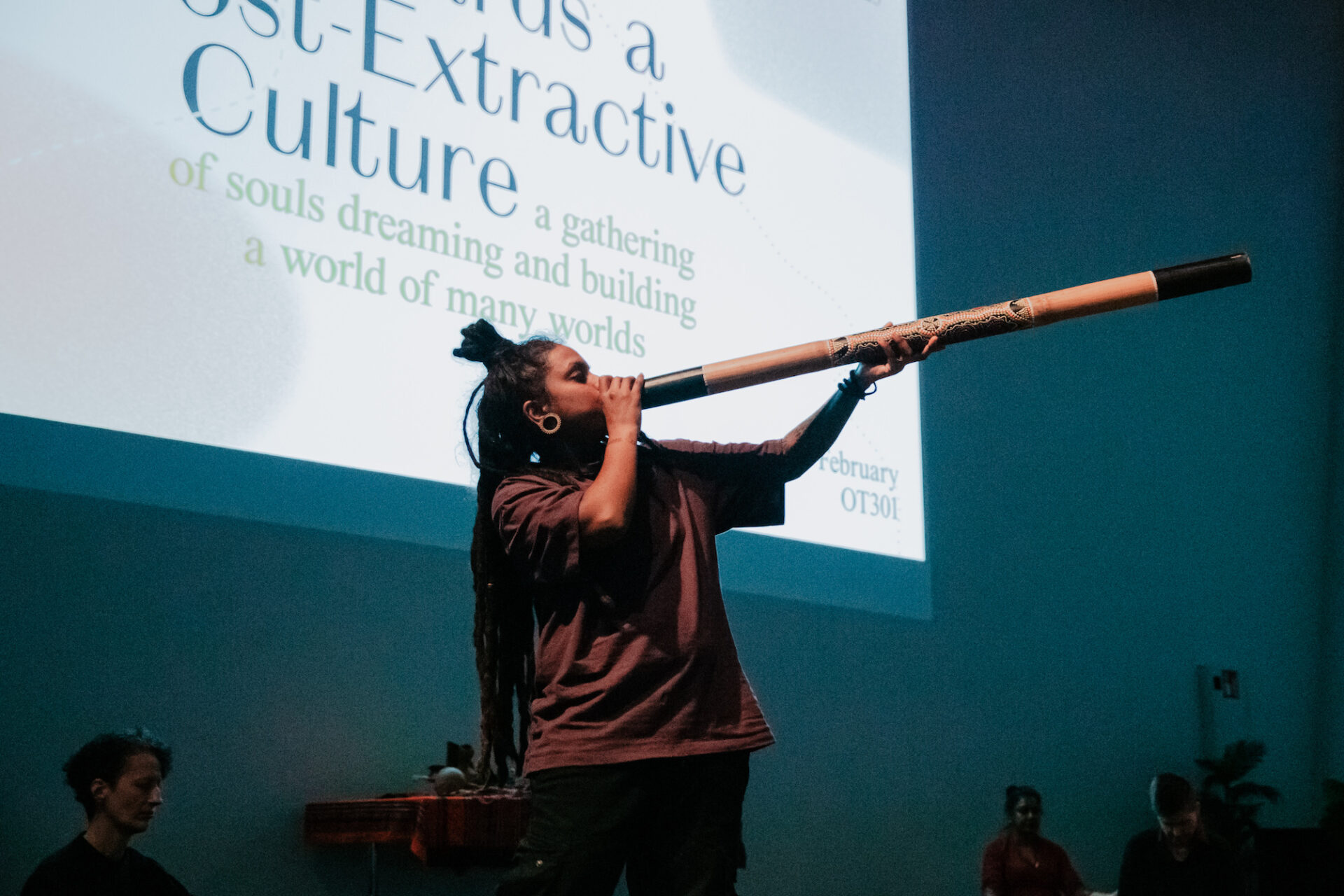
First day of ‘Towards a Post-Extractive Culture: A gathering of souls dreaming and building a world of many worlds’ at Stedelijk Museum Amsterdam (third day was hosted by OT301) Photo: Laura Ponchel
The second part of the symposium day consisted of a hybrid zoom session, wherein the audience was introduced to the artistic collective situated in the northeast of Brazil: Um Outro Céu. The collective was composed of Felipe Milanez in conversation with Juliana Xukuru, Yacuna Tuxa, Olinda Yawar and Ziel Karapotó. This network tackles the climate issues and racism that are so very present in their region and in indigenous populations. Each artist spoke of the different ways in which water holds significant power in their own communities and in their artistic practice. Water holds so many meanings; as a carrier of life, a mode of transport, and traversing boundaries and borders. The content of their stories and artistic practice spoke of deep-seeded trauma, or historical alienation and physical violence and exploitation upon the communities that they were a part of. Their stories delineated the histories of rape and war upon the indigenous communities in the northeast of Brazil, communities that are still being persecuted and killed due to the eco-fascism that is draining the amazon’s natural resources for capitalist profit.
A video work by Olinda Yawar: KAAPORA – O CHAMADO DAS MATAS that was presented, was not only visually imposing, but left the viewer to reflect upon questions she posed directly; centred around modernity’s desire for ‘development’. This video was not only a plea for awareness around the contemporary lived realities of indigenous communities in the northeast of Brazil, but it visualised the biased perceptions that indigeneity is a collateral affect to the environmental crisis.
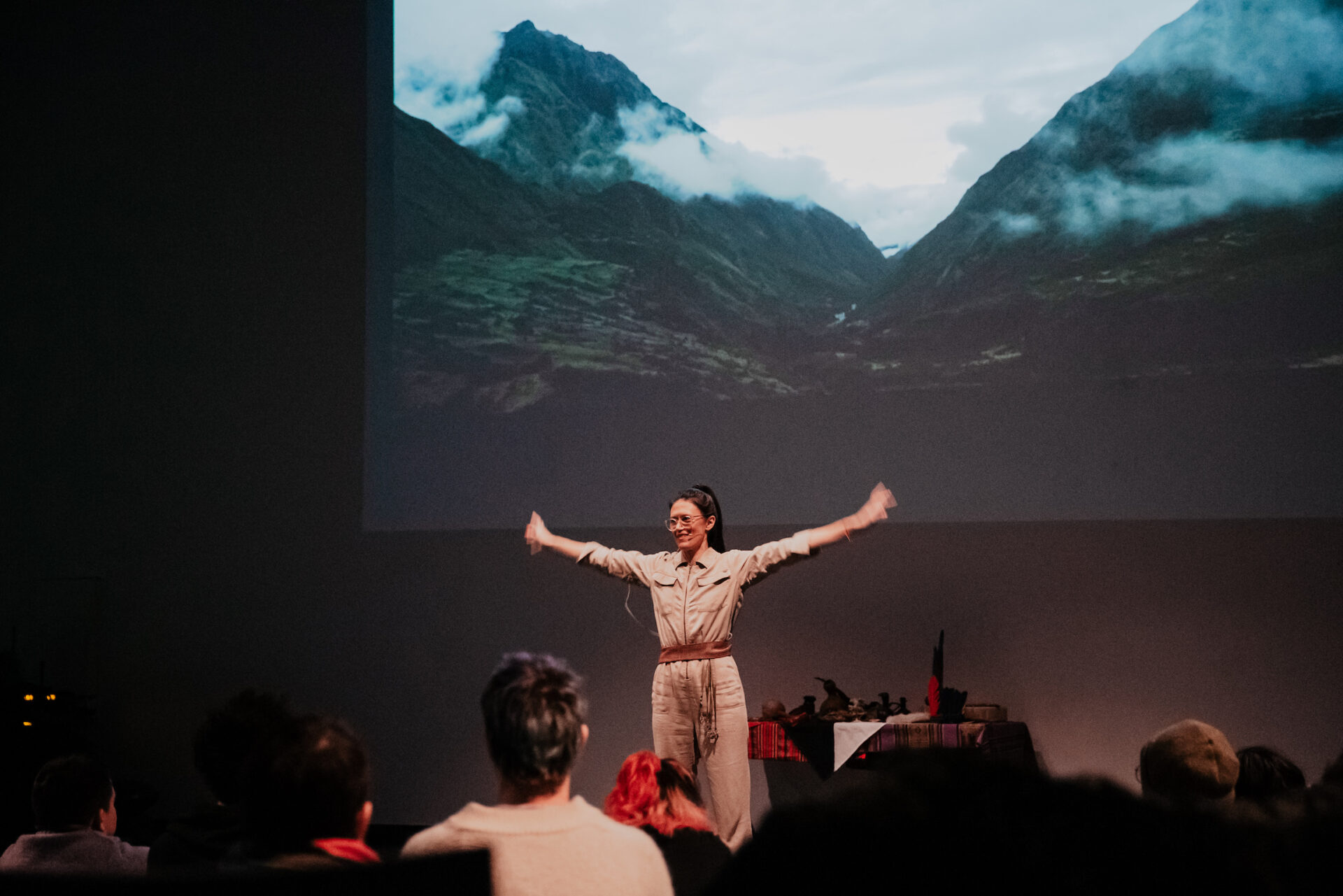
First day of ‘Towards a Post-Extractive Culture: A gathering of souls dreaming and building a world of many worlds’ at Stedelijk Museum Amsterdam (third day was hosted by OT301) Photo: Laura Ponchel
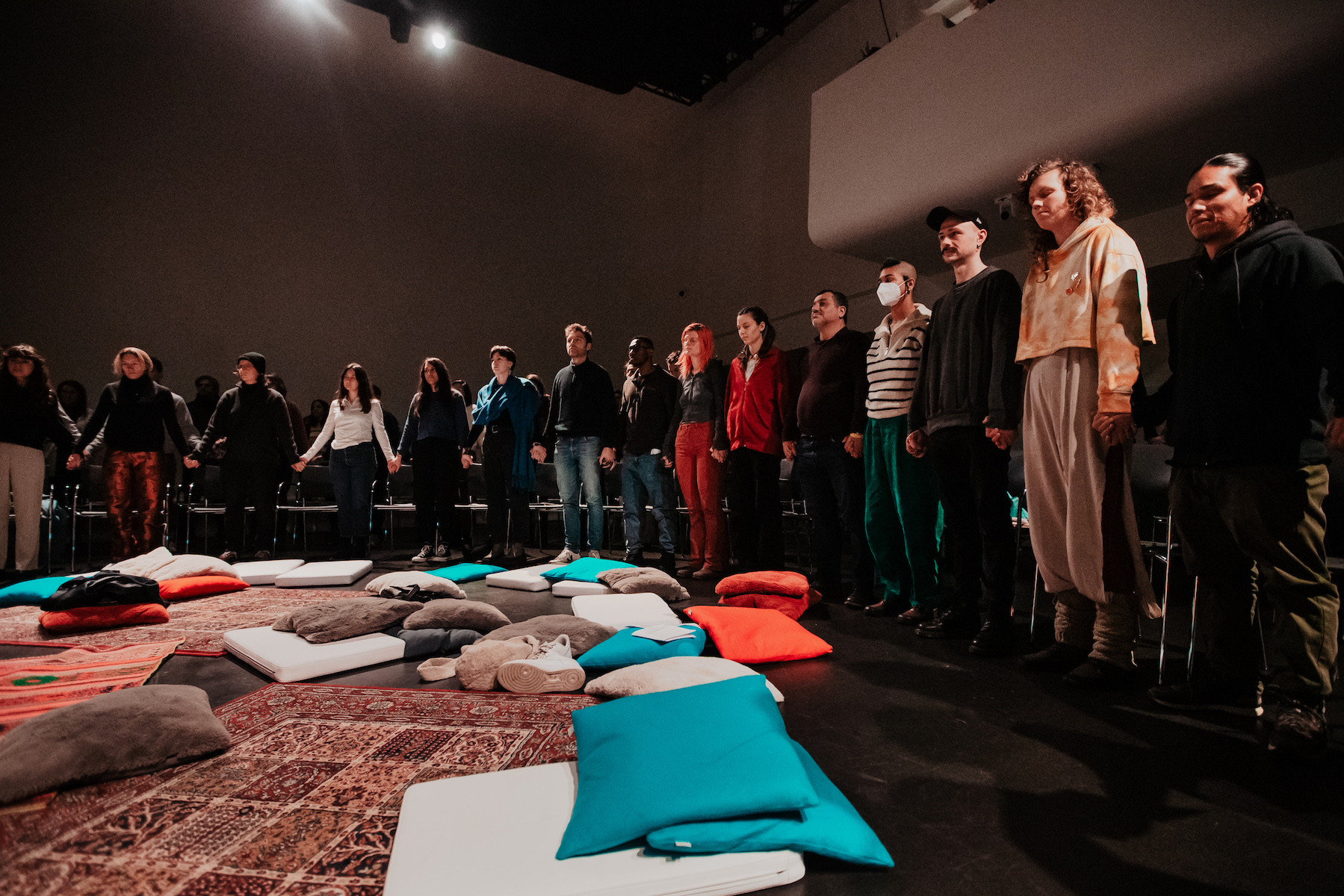
First day of ‘Towards a Post-Extractive Culture: A gathering of souls dreaming and building a world of many worlds’ at Stedelijk Museum Amsterdam (third day was hosted by OT301) Photo: Laura Ponchel
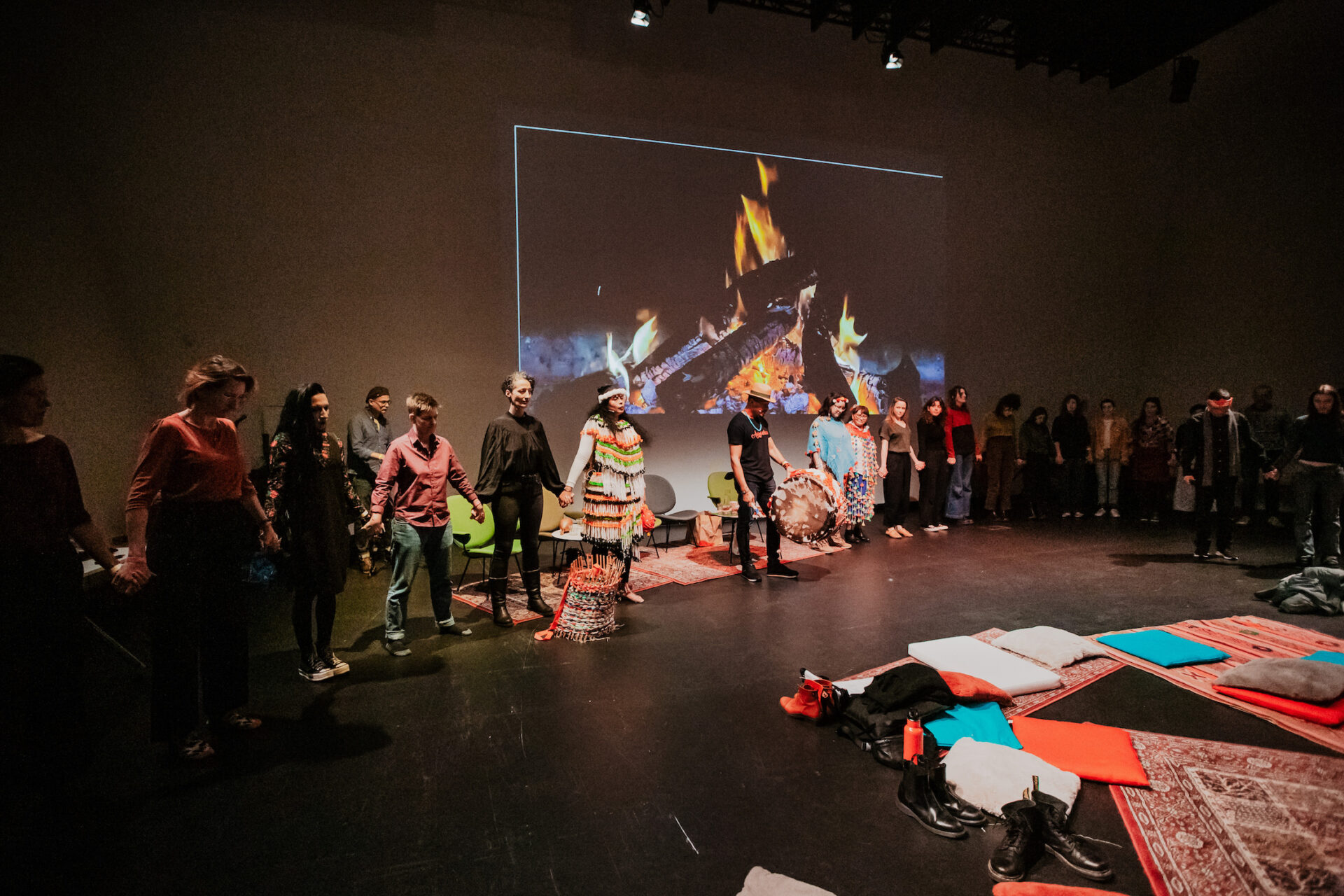
First day of ‘Towards a Post-Extractive Culture: A gathering of souls dreaming and building a world of many worlds’ at Stedelijk Museum Amsterdam (third day was hosted by OT301) Photo: Laura Ponchel
The day closed with Ausangate: a Gaseous Cosmology, a ritual performance led by Teresa Borasino, and a complete immersion into a soundscape led by Dizzi Geetha. This ceremony provided a way to slow down after a long day of listening, but it was also intended to show us just how necessary it is to situate ourselves once again in the very same space that allowed for these open relational dynamics and personal stories to be shared. The performance and ritual evoked and invoked ancestral relationships between human and more-than-human bodies and invited participants to pay attention to and breathe into a gaseous cosmology.
How could this form of post-extractive care have looked if it was able to leave the walls of the museum and take up space outside in a park, in a dance studio, in a living room or kitchen, or by a body of water?
DAY 2
The second day was set out to be more participatory, as a process that followed our deep listening, we were asked to engage within the smaller workshops, not as a passive observer, but as an active participant.
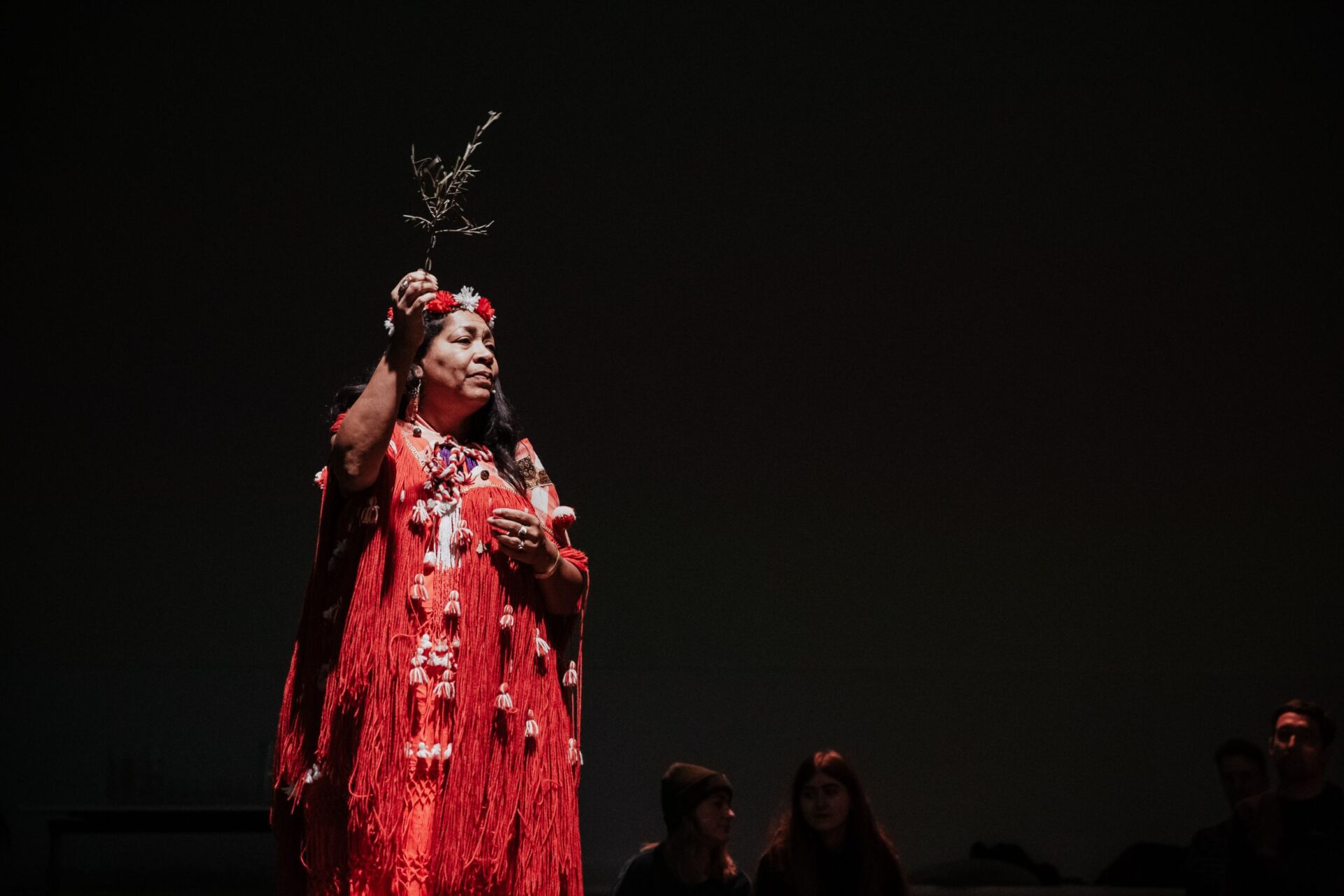
Second day of ‘Towards a Post-Extractive Culture: A gathering of souls dreaming and building a world of many worlds’ at Stedelijk Museum Amsterdam (third day was hosted by OT301) Photo: Laura Ponchel
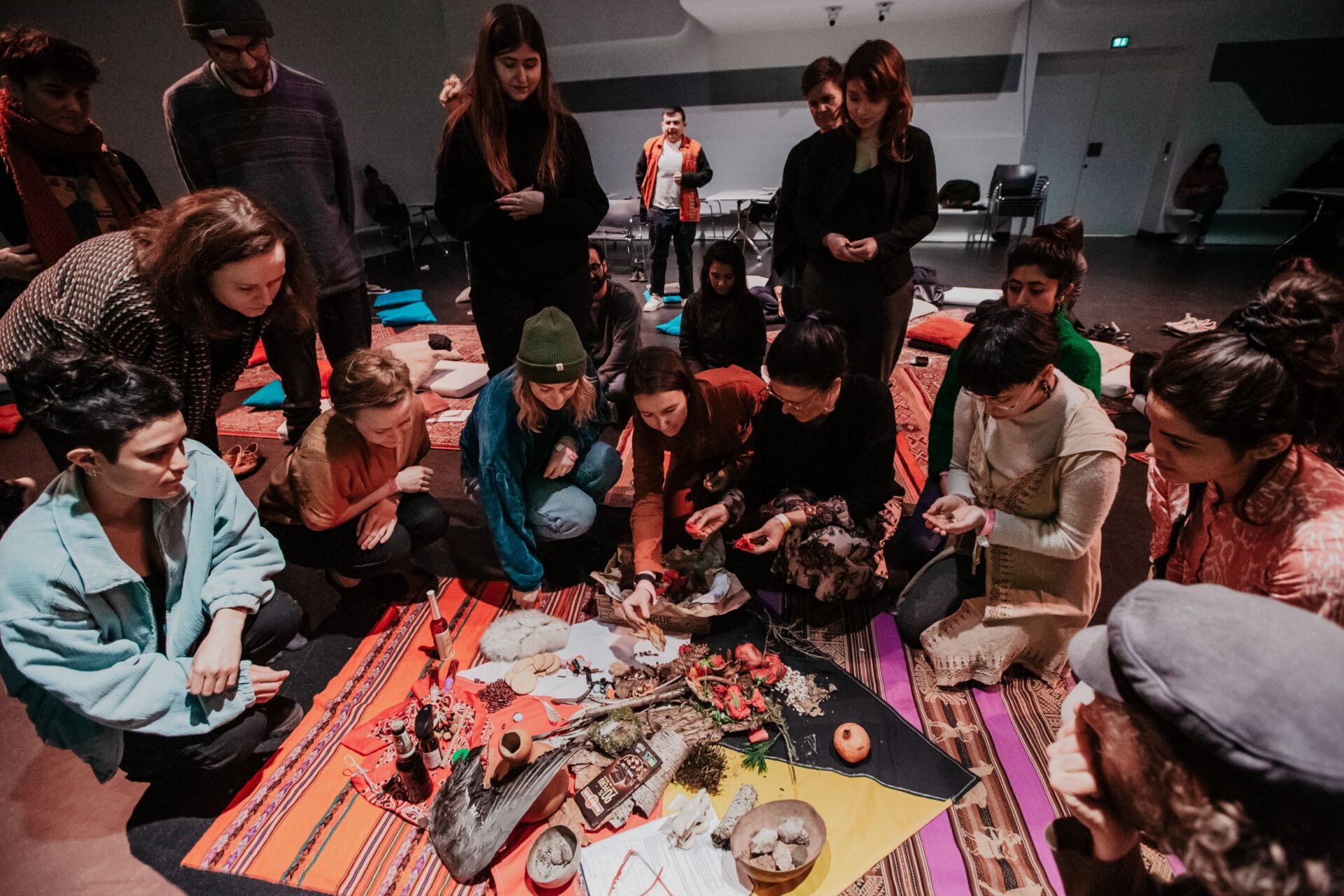
Second day of ‘Towards a Post-Extractive Culture: A gathering of souls dreaming and building a world of many worlds’ at Stedelijk Museum Amsterdam (third day was hosted by OT301) Photo: Laura Ponchel
As we moved towards post-extractive ways of being and making together, the workshop Common Reed (Phragmites) by Alejandra Ortiz de Zavallos was immensely joyful and hands on, as her workshop revolved around the practice of weaving the reed leaf. She introduced the workshop by stating that the reeds we were using were locally sourced in Berlin and Amsterdam, but the ones she was using through the zoom tutorial were harvested in her contextual setting in Peru.
The workshop; was centered around two practices harvesting and braiding, and during the zoom tutorial Daniela showed us step by step how to weave the reed between the palm of our two hands, a process of grabbing, rolling and pushing between your two palms, your pinky finger, your thumband your index – of weaving together.
This process of weaving and threading, allowed the participants to help one another as they replicated Alejandra’s hand movements, and in turn followed each other’s readings of those movements. This process of weaving together created a breathing space for the attendees to also sit amongst each other and get to know each other better, asking what brought them to the conference. Yet, it was also a moment for friend groups who came to the conference together to spend quality time with each other.
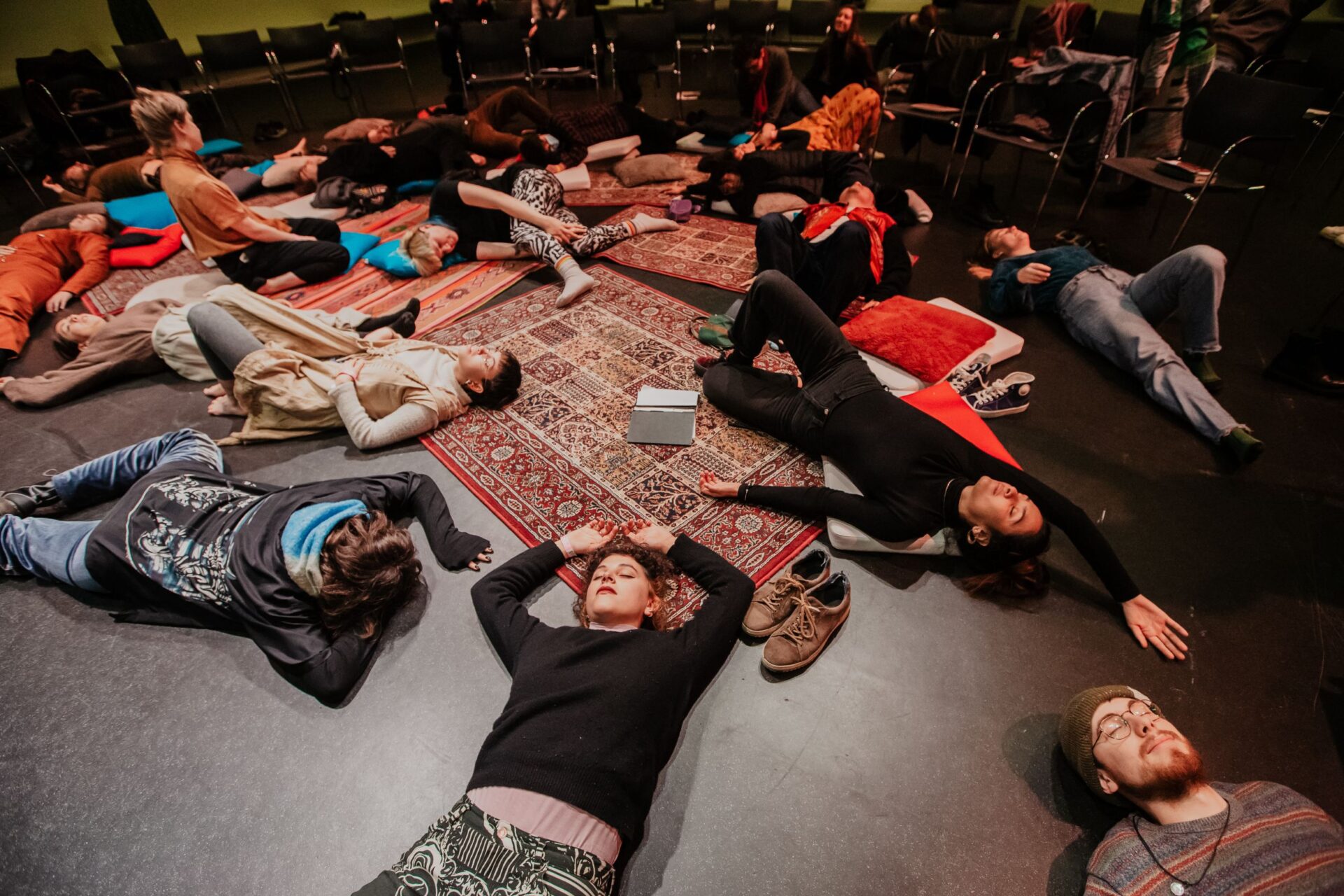
Second day of ‘Towards a Post-Extractive Culture: A gathering of souls dreaming and building a world of many worlds’ at Stedelijk Museum Amsterdam (third day was hosted by OT301) Photo: Laura Ponchel
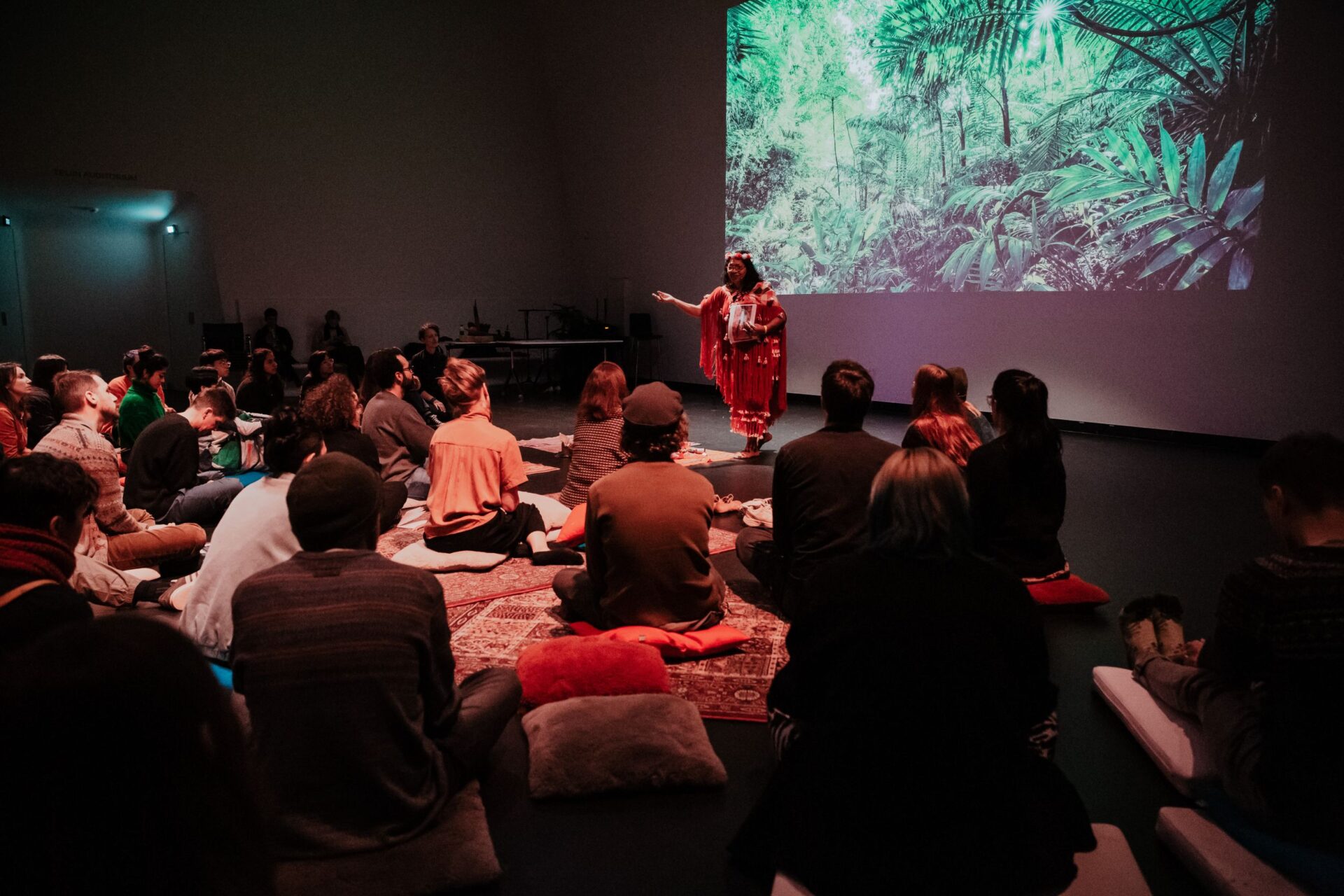
Second day of ‘Towards a Post-Extractive Culture: A gathering of souls dreaming and building a world of many worlds’ at Stedelijk Museum Amsterdam (third day was hosted by OT301) Photo: Laura Ponchel
Ultimately, what the symposium asked of us as participants and listeners was to think and look again at the structures that compose our settings and surroundings, and to imagine what it might be like to create new pathways and relational dynamics between us and our ancestors, us and the waterways that make up most of this planet, and our kinship and ties with one another. I left with an understanding of what a post-extractive culture could look like, in the form of intergenerational storytelling, practices of meditation and knowledge sharing versus knowledge gatekeeping. The forms of collective gathering and of deep listening together that I experienced during the day showed me that there are ways to replace the static and linear structures of knowledge production that one encounters in institutional spaces.
However, I often felt the setting in which we were placed offered many contradictions to the practices we were encouraged to take on, as the very foundational basis upon which the museum is built upon is one of extraction and exploitation. I left with a feeling of uncertainty, perhaps also wondering how this form of post-extractive care could have looked if it was able to leave the walls of the museum and take up space outside in a park, in a dance studio, in a living room or kitchen, or by a body of water. In spaces that are truly made accessible to everyone, where one doesn’t require a ticket or registration to enter.
All images courtesy of Disobedient Futures
Stedelijk Museum Amsterdam and OT301 hosted Towards a Post-Extractive Culture: A gathering of souls dreaming and building a world of many worlds from the 23rd to the 25th of February, 2023
Ilaria Obata
